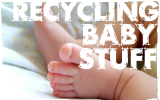How can I reuse or recycle bath water or water from the shower?
 Next Sunday is World Water Day so I thought we’d run with that theme here on Recycle This this week.
Next Sunday is World Water Day so I thought we’d run with that theme here on Recycle This this week.
Hopefully we’re all already doing what we can to reduce our water consumption – low-flush toilets, taking showers rather than baths, turning the tap off between rinses when cleaning our teeth, a water butt or two in the garden, etc – but what about reusing greywater from around the house – from that shower or bath, for example?
Proper greywater systems, which recycle washing water to flush toilets, can be expensive (in terms of set-up and space) to fit but drop household water usage by around 30%.
I know other people with showers-over baths take care with their soap use and save the water to use on their gardens, or use the still pretty-clean water to pre-soak heavily soiled clothes. (I take muddy clothes into the shower with me and stomp about on them to get the muck out before washing them as normal, saves needing a second run through the machine.)
Any other practical ways to reuse that water?























I think there are places where you can get syphons for bath water with hooks for the window so the hosepipe can be attached drectly to the garden. It might have been wiggly wigglers or Lakeland for about £17.
I got my syphon from Argos for £15!
you can displace the volume of water in your toilet tanks so that it fills up with less water with bags or other. i’m still looking into this. http://www.allianceforwaterefficiency.org/Toilet_Retrofit_Devices.aspx
or save water from taps and fill up the tank after you’ve just flushed it so that again, it’ll refill with less new water.
you can place in your toilet tank HYPPO water saver. can be found for free on some sites or ask your council. Oxfam sells it for £2
I know a family that keeps the water in the bathtub after their youngest bathes, and then gives pets baths in the same water. They have lots of animals- dogs, rodents, a cat… Today it was the smaller dog’s turn. :)
another unrelated way of saving water is through rain barrels. with the amount of pavement in our towns and cities, lots of times the water tables get screwed up- so you can slow down the flow of water into drains by collecting rain water and then pouring it in your lawn. depending on where you live you may get a lot of rain one month and hardly any the next. you can save on water you would need for a garden that way as well.
This isn’t my idea, but interesting none the less. You can transfer heat from hot shower waste water to cold incoming water. Check it out:
http://www.ecodrain.ca/en/how-does-it-work
You can put a small bottle filled with water in the water container of your toilet and save that ammount each flush
Grey water use can be so great. I’m writing and reading a lot about grey water usage for gardening. You don’t need to install expensive tanks – it’s anyway not recommended to keep grey water longer than 24 hours. Great post, thanks.
One of the ways my family has been saving water since the 1970’s is to capture the “warm-up water” for reuse instead of letting it run down the drain. When the water in your shower is heating up (this assumes you have an water heater instead of an instant water heater), put a 5g bucket under the spray and capture the water. It can be used to flush the toilet, brush your teeth, wash your face (as long as you don’t mind cold water later!) or any other thing you use water in your house for!
place a brick in the back of the toilet.
Build a filter and then run the lines to your toilet and to another electric hot water tank. This will kill the germs and can use it to do the wash in recycled hot water.
I know a guy who plugs up the drain for a shower and then uses the water for his dog.
A company here in the United States has a new product. It consists of an
in-drain pickup that collects the gray water from your shower and pumps
it through the wall and directly onto landscape plants. A small remote
turns the pump on and off. It evacuates the water very nicely…no standing in dirty water. Their website is http://www.MiragePacific.com
I think a lot of people over think this option of recycling. I live in California and although we have had a TON of rain lately for us we are still in a drought situation and we still pay for imported water. Personally, at my house my bathroom window faces my garden. All I do Is keep an old recycled pond water pump with a long hose on a hook next to my tub. While in the shower I put the stopper in place, this keeps the hot water in the tub while I shower, allowing the water to continue to heat my deepfreez of a bathroom in the early AM and allowing me to salvage the water from my bath. Then after my shower I simply drop the pump into the tum toss the hose out the window and turn it on. By the time my hair is dry the tum is almost empty and my grass is watered. almost effortless. And entirely recycled.
am looking for sol to use wast water to farm in mini greenhouse
I know this is an old thread, but I had a question. (I found this page using the “Start Page” search engine.)
I like the idea of using used bath/shower water to water a lawn or garden, but doesn’t the soap and shampoo residue kill the plants? If one used organic soaps (like Dr. Bronner) is this no longer an issue?
If you are worried that your soaps might harm your plants, maybe you need to re-think what soaps you are using.
For household cleaning, you can make your own cleansers using baking soda, vinegar, borax, peroxide, etc. If you want the convenience of a pre-made product, use earth-friendly cleaning products (Mrs. Meyer’s, Seventh Generation, etc). You do not have to fill the cup to the line the manufacturer of your laundry detergents recommend, nor do you need to fill the dishwasher detergent cup completely full. In fact, if you use half, your appliances will last a good bit longer!
That being said, an awesome way to get clothes fresh and clean without all those sickeningly heavy fragrances is to use soap nuts. They come from a tree and are a natural surfactant. They do an awesome job of cleaning clothes. You put 5-6 in a little cotton bag which may be used for 6 loads of laundry.
You may have to get over the need for “suds”. “Suds” do not result in clean clothes. (In fact, they may be harmful to your clothes and to you)!
My favorite shower/bath soap is made from goat’s milk (I especially like Zum).
Thanks for the response. I just asked because people seem to make no mention of the type of soaps/shampoos that were used in creating the bath water when they advocate using that water on their gardens. Even though it’s not right, most people use mainstream/chemically-laden shampoos and soaps, and by not acknowledging that, people give the impression that any bath water with this stuff in it is okay to use.
What about something like Cal-Ben’s five-star soap/shampoo or Dr. Bronner’s products? I could imagine that water with those products in them would be okay for plants. Then again, maybe even these products aren’t plant-friendly. (There are probably a lot of “naturally-occurring” substances that are still bad for plants.)
I use a highly sophisticated system for recycling bath water. I leave the plug in the bath and stand a bucket by the adjacent tiolet! Instead of “flushing” the tiolet, I half fill the bucket with water from the used bath and pour this down the loo!! Totally effective and I can get nearly 20 “flushes” per bath!!!
so either you must use the toilet a lot or wash infrequently
you read my mind.
Here’s what I do…
1. Our shower takes for ever to get hot, so I use one bucket to collect the water while it heats up (usually almost a bucket full) then a second bucket to collect the actual water I (or the kids) will be showering with. I use a small bucket (I bought one a target a while back that for rinsing kids hair which has a easy grip). With one of the pail full of water, I pour water on one kid. Than shampoo/lather with soap. Rinse with two pails worth of water. Add conditioner (in my case we use a few drop of apple cider vinegar, works really well). Rinse again. Total, quick bath and I bathe two kids with less than 1 bucket of water.
2. With the left over water and the cold water from the first bucket, add it to the washing machine when washing clothes.
3. Instead of connecting the drain to the drain pipe, I hooked up a hose to the drain tube and collect that water in a large plastic container, and use that water to water the grass and non-edible plants. BTW I use ECOS laundry detergent (only 1 ounce per load) and you don’t need fabric softener… I like to add about 1/4 cup of white vinegar to the softener compartment. You SHOULD NOT use the powder detergent for watering your plants, it contains a lot of salt and will kill them eventually.
Believe me, This saves a lot of water. Where we live, our water is delivered to the underground cistern pretty regularly, but there are times where none will be delivered for about 1 or 2 months… When this happens we have to order water and a big truck with a tank brings it, anyhow, one day the water guy told me that I had really made our water last, compared to our neighbors.
I screwed on one of those shut.off valves that hours on the shower head. Turn off the water when I’m lathering up. Makes me feel much better, and I realize how much we waste lathering up.
After a bath I use the grey water to clean my floors, house bins and wash the car, it is a great way to reuse the water and I use less detergent as it is already soapy.